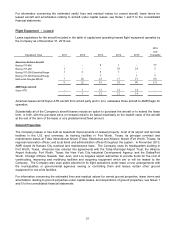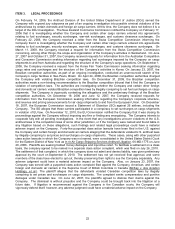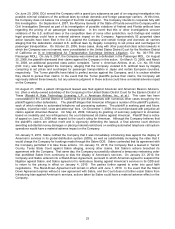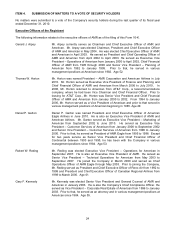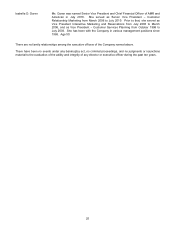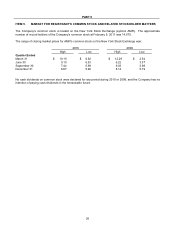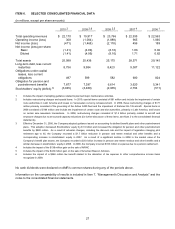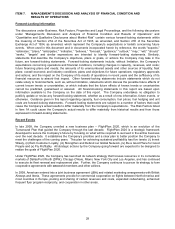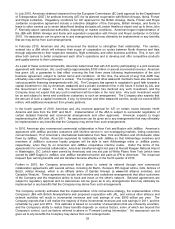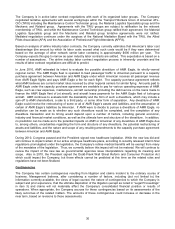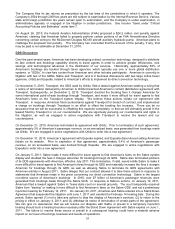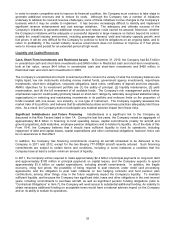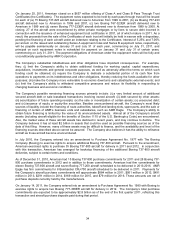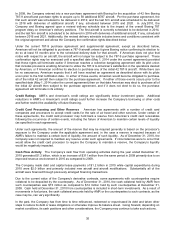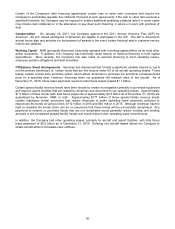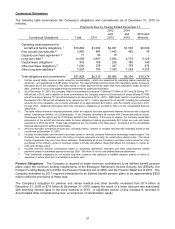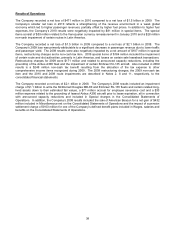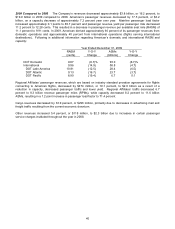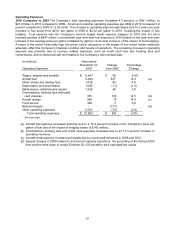American Airlines 2010 Annual Report Download - page 34
Download and view the complete annual report
Please find page 34 of the 2010 American Airlines annual report below. You can navigate through the pages in the report by either clicking on the pages listed below, or by using the keyword search tool below to find specific information within the annual report.
31
The Company files its tax returns as prescribed by the tax laws of the jurisdictions in which it operates. The
Company’s 2004 through 2009 tax years are still subject to examination by the Internal Revenue Service. Various
state and foreign jurisdiction tax years remain open to examination, and the Company is under examination, in
administrative appeals, or engaged in tax litigation in certain jurisdictions. See Income Taxes under ”Critical
Accounting Policies and Estimates” under Item 7.
On August 26, 2010, the Federal Aviation Administration (FAA) proposed a $24.2 million civil penalty against
American, claiming that American failed to properly perform certain portions of an FAA Airworthiness Directive
concerning certain wiring to the McDonnell Douglas MD-80 aircraft auxiliary hydraulic pump. American plans to
challenge the proposed civil penalty. The Company has concluded that the amount of the penalty, if any, that
may be paid is not estimable at December 31, 2010.
GDS Discussion
Over the past several years, American has been developing a direct connection technology, designed to distribute
its fare content and bookings capability directly to travel agents in order to achieve greater efficiencies, cost
savings, and technological advances in the distribution of our services. Historically, approximately 60% of
American’s bookings are booked through travel agencies, which typically use one or more global distribution
systems, or “GDSs”, to view fare content from American and other industry participants. American is currently in
litigation with two of the GDSs, Sabre and Travelport, and is in business discussions with two large online travel
agencies, Orbitz and Expedia, related to American’s efforts to implement its direct connection technology.
On November 5, 2010, Travelport, the GDS used by Orbitz, filed a lawsuit against American seeking a ruling that
a notice of termination delivered by American to Orbitz breached American’s content distribution agreement with
Travelport. Subsequently, on December 2, 2010, Travelport doubled the booking fees it charges American for
some international point-of-sale bookings through Travelport, and made it more difficult for travel agents to find
American’s fares on the Travelport system display. We believe these actions violate our agreement with
Travelport. In response, American filed counterclaims against Travelport for breach of contract, and implemented
a charge on bookings through Travelport in an effort to offset the booking fee increase. There can be no
assurance that we will be successful in offsetting this expense completely, or that we will ultimately prevail in the
lawsuit filed by Travelport or on our counterclaims. We are vigorously pursuing our counterclaims and rights in
the litigation, as well as engaged in active negotiations with Travelport to resolve the lawsuit and our
counterclaims.
On December 21, 2010, American terminated its agreement with Orbitz. Prior to termination of such agreement,
approximately 3% of American’s passenger revenue, on an annualized basis, was generated from bookings made
via Orbitz. We are engaged in active negotiations with Orbitz to enter into a new agreement.
On December 31, 2010, American’s agreement with Expedia expired, and Expedia discontinued selling American
tickets on its website. Prior to expiration of that agreement, approximately 5.4% of American’s passenger
revenue, on an annualized basis, was booked through Expedia. We are engaged in active negotiations with
Expedia to enter into a new agreement.
On January 5, 2011, Sabre made it more difficult for travel agents to find American’s fares on the Sabre system
display and doubled the fees it charges American for bookings through its GDS. Sabre also terminated portions
of its GDS agreements with American, effective July 2011. This termination, if valid, would entitle Sabre to make it
more difficult for travel agents to find American’s fares through its GDS and materially increase the fees it charges
American for bookings through its GDS, as well as allowing Sabre to terminate its GDS agreements with
American entirely in August 2011. Sabre alleges that our contract allowed it to take these actions in response to
statements that American made in the press concerning our direct connection technology. Sabre is the largest
non-direct source of American’s bookings. In 2010, over $7 billion of American’s passenger revenues were
generated from bookings made through the Sabre GDS. In response to Sabre’s actions, on January 10, 2011,
American filed a lawsuit against Sabre in Texas state court on several grounds. The court temporarily enjoined
Sabre from “biasing” or making it more difficult to find American’s fares on the Sabre GDS, and set a preliminary
injunction hearing for February 14, 2011. On January 23, 2011, American and Sabre entered into a Stand Down
Agreement that suspended the litigation until June 1, 2011 and vacated the February 14 hearing date. During this
period, Sabre agreed (1) not to take any actions to bias the display of American’s services; (2) to return to the
pricing in effect on January 4, 2011; and (3) withdraw its notice of termination of certain parts of the agreement.
We can give no assurances that we will resolve our disputes with Sabre or prevail in a temporary injunction
hearing should such a hearing become necessary after the Stand Down Agreement with Sabre expires on June 1,
2011. The failure to resolve these issues or prevail in a subsequent hearing could have a material adverse
impact on our level of bookings, business and results of operations.


